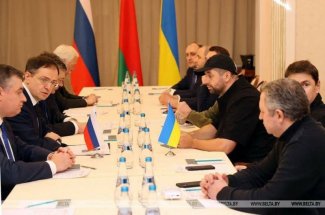Playing for time or faking a play: Ukrainian-Russian negotiations

On 28 February Ukrainian-Russian talks took place. President Volodymyr Zelensky initially rejected the Russian side’s offer to meet in Belarus, which is a participant in the aggression and is allowing Russian troops to strike from its territory. However, after a telephone conversation with Alyaksandr Lukashenka, he agreed to meet near the city of Pripyat on the Belarusian-Ukrainian border. The talks lasted over five hours, but no joint communiqué was issued afterwards. It was only announced that the next meeting would be held on the Polish-Belarusian border in the coming days. Commenting on the talks immediately after their conclusion, their participant, Zelensky’s adviser Mykhailo Podolak stated that “the negotiations were difficult, although no ultimatums were made”, and that Russia continues to perceive its destructive actions in an extremely biased manner. Zelensky, on the other hand, stated that the desired result has not yet been achieved, although “we have received certain signals”. According to him, the fact of the Russian shelling coinciding with the negotiation process was not an accident, which was “an unacceptable tactic”, and that only after the delegation returns to Kyiv will a decision be made on whether to participate in another round of negotiations.
The Russian delegation was headed by Vladimir Medinsky, an advisor to the president. Russia’s initial position has not softened. Andrei Rudenko, a Russian deputy foreign minister taking part in the talks, maintained that Ukraine should demilitarise and “de-Nazify itself”. Another member of the delegation, the head of the State Duma’s foreign affairs committee Leonid Slutsky, emphasised Russia’s uncompromising attitude by suggesting that the negotiations with the Ukrainian delegation were an opportunity to work out a “road map” for reaching an agreement. He also emphasised that any such agreement should be implemented quickly.
The Ukrainian delegation was led by David Arakhamia, the head of the Servant of the People party. Just before the talks began, the Ukrainian side presented its position. For Kyiv the key issues in the negotiations are to obtain an immediate ceasefire and the withdrawal of troops from Ukrainian territory.
Vladimir Putin held a conversation with the President of France in parallel to the talks. The Kremlin’s communiqué announced that Ukraine must recognise the annexation of Crimea, undergo demilitarization and “de-Nazification” (most likely the resignation of the Ukrainian president), and accept the status of a ‘neutral’ state in order to stop hostilities.
Commentary
- The first round of Russian-Ukrainian talks did not bring any results. The Russian side hopes that the demands it made of Kyiv during the meeting could be partially implemented under the threat that the Russian army will continue shelling civilians. It can be assumed that the Kremlin’s primary concern is to humiliate Zelensky by forcing him to recognise Crimea as part of Russia and to get Kyiv to cease accepting military supplies from the West. The conditions of demilitarisation and ‘de-Nazification’ are unacceptable to the Ukrainian government.
- These talks with the Ukrainian government representatives are part of the Kremlin’s political and military operation. After the first phase of the military operation, which has not been overwhelmingly successful, the Russian side wants to establish whether the military actions undertaken so far have reduced Kyiv’s will to resist. In the propaganda dimension, this was supposed to signal Russia’s alleged readiness for peace talks, while still retaining its dominant position. The combat operations were not suspended for the duration of the talks; ground combat and air strikes against civilians, such as in Kharkiv, continued, and a rocket attack on Brovary near Kyiv began shortly after the talks ended. This shows that Russia wants to force Kyiv into submission by all means possible, gradually increasing its brutality.
- The Russian and Ukrainian delegations were fairly low-level in status, which means that Moscow and Kyiv considered the talks to be a preliminary step allowing them to articulate their positions. The participants in the talks lacked the authority to make binding decisions. However, it is hard to expect that the Russians will give up or alter their conditions which, if accepted by Kyiv, would mean Ukraine’s unconditional surrender. Putin has not yet achieved his goals in Ukraine, and any agreement at this stage of the conflict – even a formal concession by the Ukrainian side – would be perceived as proof of Russia’s weakness, which would strengthen Ukraine and confirm that the West has been correct in adopting its assertive policy towards Moscow.
- The very fact that these talks were arranged was treated by the two sides as a tactical game. The Russian side forced the Ukrainian delegation to attend in order to emphasise that it was ready to work out a ‘road map’ for de-escalation. Meanwhile by agreeing to the talks, the Ukrainian side avoided possible accusations from the Russian side that it was provocatively rejecting the peace offer. At the same time, it does not appear from the Ukrainian government’s statements that Kyiv is ready to make any far-reaching concessions at this stage.





